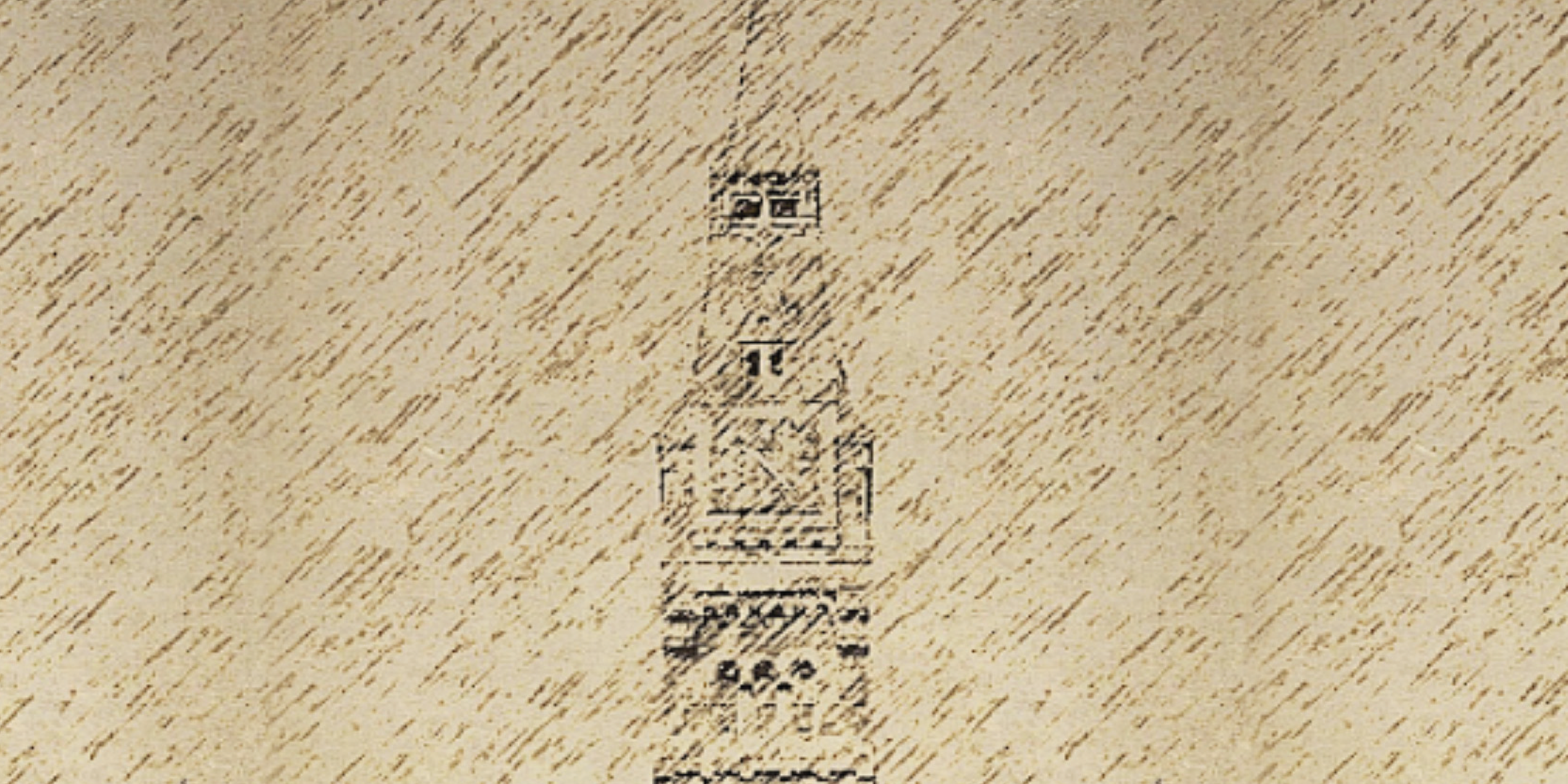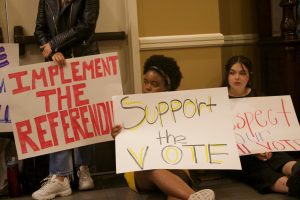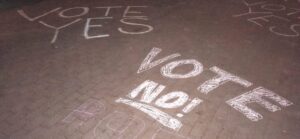Perched inside the window of GUSA’s Leavey Center office, there is a sign reading “This school exists because of slavery.” These words, written in a burst of red permanent marker, refer to the 272 enslaved people the university sold in 1838 to stay financially viable. The sign represents part of the university’s history that has created division and, for some, a profound sense of responsibility. Much of the focus—including from national media—has been on a few marquee events, like the GU272 referendum last April and the initial splashy exposé in The New York Times in 2016. But in the classroom, “Facing Georgetown’s History,” a course in the American Studies program, has offered a look at the university’s past from an academic viewpoint.
In the wake of student activism around the GU272, this class offers a chance to gain in-depth knowledge from an academic perspective. The course focuses on the connection between Georgetown’s Jesuit community and slavery and introduces students to descendants of the 272. Since its inaugural semester in 2016, Adam Rothman, an associate professor of history, has taught the class.
Faculty and students alike have been integral to Georgetown’s recent effort to reckon with its history with slavery. In January 2019, a group of students called the GU272 Advocacy Team began pushing for a student referendum that proposed establishing a $27.20 fee to be collected from students each semester to benefit the 9,000-plus descendants of the GU272. Georgetown undergraduates approved the referendum by a margin of 1,237 votes on April 12. The vote was meant to serve as a recommendation that the university’s board of directors institute the fee.
Following the initial revelation that the school contributed to the atrocity of slavery, University President John DeGioia gave a speech in which he said the university would offer a formal apology, create an institute for the study of slavery, and build a public memorial. He also granted preferential admissions status to descendants who applied to the university. Though the university has followed through on some of these promises, neither an institute nor a memorial has been created.
“The University is launching advisory groups to move forward on projects and activities in three areas: Descendant and Community Engagement; Public History; and Academic and Research Initiatives,” a university spokesperson wrote in an email to the Voice. “Memorialization will be covered by the Public History group.”
While the university has been slow to act on the issue, students in Rothman’s class have been asked to confront it in every class meeting. “The course makes clear that the history of slavery is not something that took place somewhere else in America, but right here in our own backyard,” Rothman wrote in an email to the Voice.
Melisande Short-Colomb (COL ’21), who is one of three descendants who currently attends the university, took the class last semester. In her experience, most students in the class were already familiar with the 272 and the implications the history has for the university today before enrolling in the class, but the knowledge they gained from the class was much deeper. “I do think that students who take the class are better informed to engage with their peers and their families and bring them more information,” she added.
The class is only possible with the support of the American Studies Program, which is dedicated to asking questions about power and identity in American culture.
Rothman, a member of the Georgetown University Working Group for Slavery, Memory, and Reconciliation, collaborated with Erika Seamon, then director of the American Studies Program, to create the course and break down its mission into three primary goals: learn about the history of the Jesuits and slavery, engage with descendants, and produce student-created content on the subject.
Rothman’s first mission with the course is to expose students to the topic and give them foundational knowledge. Students in the course dig into the Georgetown Slavery Archives and examine materials, followed by discussion, analysis, and writing about them. “We have now more students around Georgetown who are deeply versed in the particular details of this history,” Rothman said on a panel at the 50th anniversary event for the American Studies Program, entitled “American Studies 272: Facing Georgetown’s History.” “They know all the dimensions of the different stories that have come out of Georgetown, the Jesuits, and slavery, not just what happened in 1838.”
As a part of the second goal of the course—to engage with members of the descendant community—students travel to southern Maryland, where they visit a Jesuit plantation and meet, talk, and work with descendants of other people enslaved by the Jesuits. In past years, Rothman and Bernie Cook, Georgetown College associate dean who advises American Studies students, have organized spring break trips to Louisiana for students in Rothman’s AMST 272 class and Cook’s “Social Justice Documentary” course. On the trips, students visit with descendant communities concentrated in New Orleans and Maringouin. The group visits a cemetery where members of the GU272 are buried and a plantation where some of the slaves were sold. They also engage in conversation with descendants.
Omi Okunola (COL ’20) took AMST 272 in the spring semester of 2019 and went with Rothman on the trip to Louisiana. “I think one of the beauties of engaging with the descendant community is recognizing that just like any other group, they differ in the viewpoints, opinions, and expectations of what they expect from the university and from students,” she wrote in an email to the Voice. “I and others (particularly those stuck in the Georgetown bubble) need to do more listening instead of talking or ‘teaching.’”
This focus on engagement pushes Georgetown students to interact with descendants, whose lives bear the scars of their ancestors’ enslavement and sale by Georgetown. In Maringouin, a town with a population of little more than 1,000 people, 90 percent of the inhabitants are descendants from the GU272.
The third objective of the course encourages students to produce their own content, culminating in the class’ final project of creating a podcast about the relationships between Georgetown, Jesuits, and slavery. The podcasts, which are filed under “American Studies 272” on the Georgetown Slavery Archive website and SoundCloud, feature interviews with experts and descendants. Rothman noted that students have used these podcasts not just to find their own voices but to amplify the voices of the descendant community.
Charlotte Jackson (COL ’20) took the course last spring semester. She produced a podcast that explored a variety of perspectives on the use of reparations in reconciliation, which she says has proved useful in sharing the information she learned in class. “Because these are such intense topics and require a great deal of backstory and explanation, it has been immensely helpful to have a tangible podcast to send to friends, family, and anyone else who has been interested in the work that we did as a class,” Jackson said.
The emphasis on the dissemination of information seen in the class was also utilized by members of the GU272 Advocacy Team, who hosted town halls and meetings to educate fellow students in the run-up to the referendum. Short-Colomb, who was herself part of the advocacy team, attributed most of the awareness of the 272 on campus to the creators of the advocacy team—mainly seniors who have now graduated—who were afraid the history would be forgotten with the graduation of the last class who was on campus when the sale of the enslaved people was first revealed by The New York Times.
“I think the general knowledge right now is fair because of the referendum last year, which fully engaged the student body and put national awareness on it for incoming students,” Short-Colomb said. “We are tasked with ensuring that ‘fair’ to ‘good’ grows into ‘excellent’.”
Short-Colomb believes that while the presence of descendants on campus may lead to more students learning about the 272, it does not mean it is the responsibility of those descendants to educate fellow students about Georgetown’s past or to recruit other descendants to the school. “It’s not my responsibility as a descendant, it’s the administrators’ responsibility as the heads of the university in keeping with the promises they made,” she said.
Despite some success in persuading students, advocates for the reconciliation contribution were unable to sway the university. On Oct. 29, DeGioia released a statement announcing that while the administration would not implement the referendum’s proposed mandatory fee, they would begin to raise voluntary contributions. “The university will ensure that the initiative has resources commensurate with, or exceeding, the amount that would have been raised annually through the student fee proposed in the referendum, with opportunities for every member of our community to contribute,” the statement reads.
This program would accept, but not require, money from current students, and is intended to raise the same amount of money as the referendum through outside contributions. Funding is set to begin in the 2020-2021 academic year.
After the announcement, the Students for GU272 Facebook page posted a statement expressing disappointment with the decision of the administration. “This transforms the fund that was intended to repay a debt that Georgetown has owed for over 400 years into a philanthropy effort,” the statement reads. “The GU272 referendum is the vehicle through which 2,541 students have committed to engage in reconciliation with descendant communities through, and Georgetown University is actively denying our voices.”
The voluntary contribution idea had previously been espoused by critics of the April referendum and misses the point of the referendum, Short-Colomb says. “The administration did what they said they were going to do—not value or honor the vote of the students,” she said. “But they did an alternative thing which was the position of the opposition.” Following the vote, Todd Olson, vice-president of student affairs, released a statement stating that the university appreciated the insight of the students but never said it would uphold the referendum results.
Whether they are heard or not, student voices have always been involved in dealing with Georgetown’s history with slavery. Some of the first people to try to bring this history to light were American Studies students between 1995 and 1998, when they started transcribing and digitizing historical materials relating to six Jesuit-owned plantations in Maryland. Eventually, that work turned into the Jesuit Plantation Project (JPP), a collection of archives with information about people enslaved on Jesuit plantations. Next came the Georgetown Slavery Archive, which allows students, researchers, and descendants alike to access records about the creation and impacts of the plantations. The archive was established in 2016 by the working group as a part of the group’s effort to learn about and reflect on Georgetown’s history with slavery.
The students dove into a variety of documents, including the Jesuits’s Maryland Province Index. They recovered information for the project from reading the writings of Br. Joseph Mobberly, S.J., a former overseer on one of the estates, who wrote detailed accounts of the Jesuits and the treatment of the slaves in his diary. These students often spent their Fridays transcribing and archiving these records. Their work set in motion a decades-long commitment to this history within the American Studies Program, a mission now embodied in Rothman’s course.
At the American Studies 50th anniversary panel, Sharon Leon (COL ’97) spoke to how the students in the mid-90s started the massive endeavor of digitizing the records and building the JPP. “We came at this work from the perspective of Jesuits participating in the process of enslavement and the perpetuation of enslavement,” Leon said.
Students in the course have said they believe courses like AMST 272 are crucial to all Georgetown students, whom they believe reap the benefits of the enslavement and sale of the 272. “I think it is easy for current students to try to separate themselves from Georgetown’s history with slavery. While we obviously did not enslave, barter, and sell anyone ourselves, we are nevertheless reaping the benefits of the 1838 sale,” Okunola said.
Short-Colomb believes students should not be able to graduate from the university without ever hearing about the legacy of the 272. “Our hope is that over the course of four years every school and curriculum will incorporate this history into their curriculum,” she said. “It cuts across sectors of learning.”
The class, as well as activism on campus, reminds students that the repercussions of the sale over 180 years ago are ongoing. “What people fail to realize is that while the institution of African American slavery came to an end two centuries ago, the ramifications of this history are still observable to this very day,” Okunola said.
The advocacy team identified a few key areas in which the money that would have been collected as part of the mandatory reconciliation contribution could have been used. The charter for the proposed GU272 Reconciliation Board of Trustees directed funds to be allocated to medical care, improved infrastructure in descendant communities, and increasing educational opportunities.
“This course is not only about America and Georgetown’s history with slavery; it’s also about what we should be doing now to encourage broad-scale restorative and reparative justice,” Jackson said.
As students walk through the Leavey Center, the sign in GUSA’s window remains present as a reminder of the history that has been revealed over the past four years. With the educational efforts of both the class and the GU272 advocacy team, more and more people are beginning to grapple with the history behind the words “This school exists because of slavery.”







